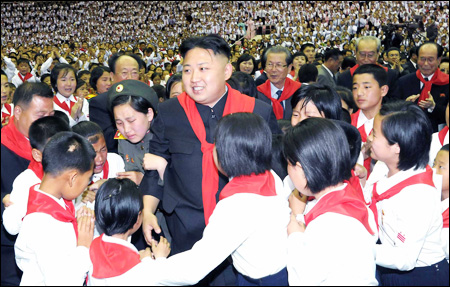N. Korean leader seeks to bolster public image

- North Korean leader Kim Jong-un smiles as he is surrounded by children during a celebration to mark the 66th anniversary of the founding of the Korean Children’s Union in Pyongyang in this image released by the North’s Korean Central News Agency, Wednesday.
North Korean leader Kim Jong-un has stepped up a public relations campaign to bolster popular support, distinguishing himself from the reclusive style of his father Kim Jong-il.
The young leader, who was handed power following Kim’s death in December, made his second major speech to some 20,000 young people in Pyongyang on Wednesday, doubling the number of speeches made by his father during his reign.
Watchers believe Kim’s more public persona — including multiple appearances with children — is part of efforts to tie him to the memory of his popular grandfather, late country founder Kim Il-sung, and shore up the standing of the regime.
“When we look at Kim Jong-un’s behavior, it is virtually identical to that of Kim Il-sung in his 30s and 40s,” Park Young-ho of the Korea Institute for National Unification said. “He has to get support in all circles, including the rising generation.”
Kim — the “Supreme Leader” of the nation — derives his power from his royal bloodline.
Kim Jong-il, who took power in 1994, was said to be engaging in private but left behind perceptions of being more distant from the populace than his father.
In contrast, Kim Jong-un wore the red scarf of the children’s union and was seen smiling and laughing with the crowd. “In a sense, it is not Kim Jong-un’s leadership style that is extraordinary as much as Kim Jong-il’s was an anomaly,” Park said.
Pyongyang underscored the significance of Kim’s appearance before the youths by issuing threats to South Korean media outlets over what it deemed negative coverage of the festivities. They marked the 66th anniversary of the founding of the Korean ChildrenUnion.
Earlier in the week it threatened to attack conservative outlets in Seoul for portraying the event as a political show, calling the coverage a “smear campaign.”
The contact with the populace comes as the nation deals with food shortages that could be exacerbated this summer by drought. Rainfall on the nation’s west coast during May was the lowest in a half century, according to the country’s official Korean Central News Agency. Kim Jong-un’s rise has been tied to efforts by Pyongyang to improve the quality of life for its people and some watchers say poor food conditions could negatively affect sentiment.
He sought to reinforce the vision in the speech, saying the children would inherit “a most powerful country where every home will be full of laughter and everybody lives in harmony.”
It remains to be seen if Pyongyang will request aid as it has during the past two summers when it was slammed by floods. Such requests, however, may be constrained by international anger over its provocative rocket launch last month.
Experts also expect the regime to continue its vitriol against the South for the time being as it seeks to push voter sentiment toward an engagement-oriented candidate in this year’s presidential polls.
Tensions have been high between the sides during the conservative Lee Myung-bak administration, who has tied the provision of assistance to denuclearization and emphasized human rights. <Korea Times/Kim Young-jin>

























































